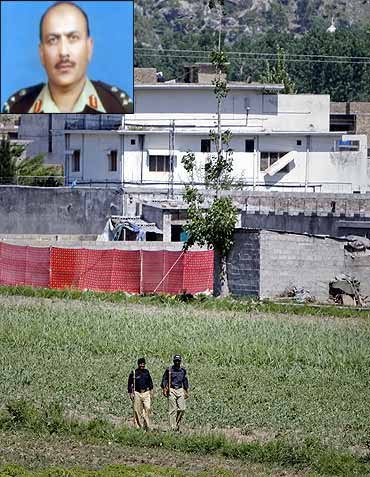
Amir Mir wonders if the jehadi penetration of the Pakistani armed forces is deeper than feared.
The interrogation of the under-detention Brigadier Ali Khan and four majors of the Pakistan Army have revealed that a group of senior anti-American military officers was planning to stage a coup against the Pakistan People's Party government in Islamabad.
This was besides removing the incumbent military leadership with the help of their like-minded colleagues, as envisaged by the Hizb ut-Tahrir, an Al Qaeda-linked shadowy militant group which wants to capture the state power in Pakistan and to convert the country into a pure Islamic state by reviving Khilafat (Caliphate) system.
Pakistani military spokesman Major General Athar Abbas was the first one to confirm that Brigadier Ali Khan was arrested because of his links to the HuT and that he was being interrogated by the Special Investigation Branch of the Military Intelligence along with several other officers, including four majors.
Brigadier Khan, who had been posted at the general headquarters of the Pakistan Army in May 2009 as in charge of the regulation directorate, was actually taken into custody on May 6, 2011, hardly three days after the May 2, 2011 killing of Al Qaeda chief Osama bin Laden in the Abbottabad city of Pakistan in an American military raid.
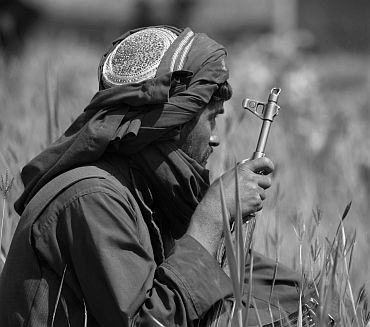
But the military spokesman was quick to dispel the impression that the brigadier was linked with the investigations into the Abbottabad episode.
"The detention shows that the army is determined to weed out bad actors. We don't allow any other cult in the armed forces other than the military one. We have zero-tolerance policy for any extremist ideology in the army," said Major General Athar Abbas.
Khan's arrest surprised many of his colleagues since he comes from a family with three generations in the military service, besides having a bright service record. While his father was a junior commissioned officer, his younger brother is a colonel in a Pakistani intelligence agency.
His son and son-in-law are both army captains. But his wife, Anjum Ali, has rejected the allegations as rubbish. "Almost every general of the Pakistan Army knows Brigadier Ali Khan. Even Army Chief General Ashfaq Kayani knows him," she told a foreign news agency on June 22.
"We can never think of betraying Pakistan Army or our country. My husband is an intellectually honest, patriotic and ideological person. Unfortunately, it has become a fashion in Pakistan that whosoever offers prayers and practices religion is dubbed as Taliban friendly. Our three generations have served the army and none of our family members have had any links with the militants," she insisted.
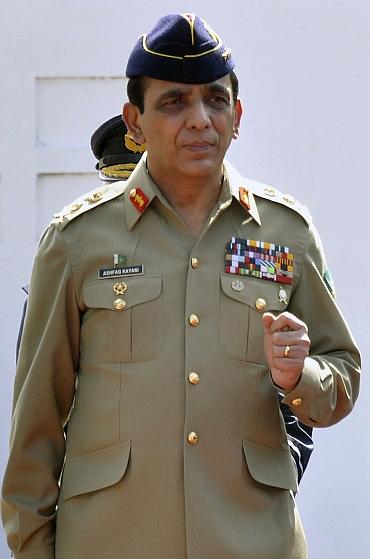
The brigadier, who was repeatedly denied promotions because of his extremist leanings, had served as an army commander in Pakistan occupied Kashmir before his last posting at the GHQ.
His close associates say he had been highly critical of the present army leadership over its relationship with the United States. He had been exerting pressure on the top echelons of the army to stop cooperating with the American forces in the fight against Taliban and Al Qaeda insurgents.
Therefore, successive promotion boards used to reject his promotion to the next rank while his colleagues and subordinates continued to rise up the promotion ladder, overtaking him. Indeed, at the time of his arrest, Khan was the oldest-serving brigadier in the Pakistani Army.
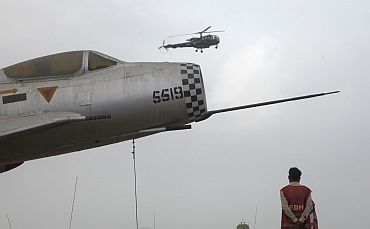
As a matter of fact, Khan is not the first high-ranking army officer arrested for his alleged ties with HuT, which represents a new breed of Islamic fundamentalists, who study at top British and American educational institutions yet abhor Western values, advocate a pan-Islamic state and favour the removal of the pro-United States government in Islamabad.
Colonel Shahid Bashir, the then commanding officer of the Shamsi Air Force Base in Balochistan, was also apprehended by the military intelligence on May 4, 2009 for links with HuT.
Bashir was arrested along with a retired Pakistan Air Force fighter pilot squadron leader-turned lawyer Nadeem Ahmad Shah, and a US-educated mechanical engineer and Green Card holder Awais Ali Khan.
Colonel Bashir was subsequently accused of leaking out secrets pertaining to the Shamsi Air Force Base, which was being used by the American Central Intelligence Agency at that time to launch drone attacks on Al Qaeda and Taliban-linked militants in the Federally-administered Tribal Areas of Pakistan.
He conceded that he and several other PAF officers were in touch with the HuT which had been inciting them to launch a rebellion against the country's khaki and political leadership for their pro-American policies.
Colonel Bashir was eventually court-martialled on charges of spying and provoking the armed forces personnel to get involved in terrorist activities.
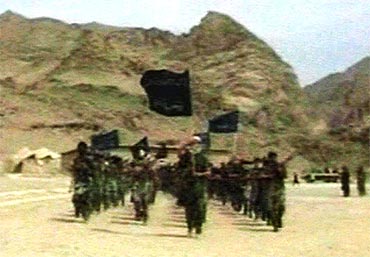
Those interrogating Khan and several other senior army officers have concluded that the HuT has the same objectives as Al Qaeda: the enforcement of Islamic rule in accordance with the Shariah (Islamic Laws) in Muslim majority countries and the restoration of an Islamic Caliphate.
HuT, which claims to be a peaceful political party with Islam as its ideology, was actually established in Jerusalem in 1953 by Shaikh Taqiul Deen Al Nabahani (1909-1977), a religious cleric and a judge in the Shariah Court.
The stated goal of the HuT at that time was to establish an expansionist super-state they would call the Khilafah (Caliphate), initially consisting of Muslim-majority states and finally expanding to the rest of the world.
The contention of the Pakistan chapter of the HuT is that the current rulers of Pakistan, civilian as well as khaki, are American agents and their only agenda is protecting the American interests.
The Hizbul considers Pakistan's strategic location, particularly its proximity with Muslim-majority countries including the Central Asian states, suitable for implementing its agenda. Following the killing of Osama bin Laden, the Hizbul activists had been distributing leaflets, urging army officers to rise up in revolt against their leadership.
"It is a slap in the respected officers' faces that the American helicopters intruded in the dark of night and barged into a house like thieves. Remember, it could not have been possible without the acquiescence of your high officials", one such pamphlet read.
Being a proscribed organisation, the HuT does not have any offices in Pakistan and its organisational affairs are mainly looked after by its office bearers from their homes. However, the problem for Pakistani agencies is that the actual leadership of the group in Pakistan remains undisclosed, even to the members, due to security fears.
The Pakistan chapter of the Hizbul was established in December 2000 when a group of British youth of Pakistani descent (headed by Imtiaz Malik and guided by British-Pakistanis Dr Abdul Wajid in Lahore and Dr Abdul Basit Shaikh in Karachi among others) decided to use Pakistan as the base camp for their movement to re-establish Islamic Caliphate.
While Imtiaz is considered to be the underground leader of the HuT in Pakistan, his deputy, Naveed Butt, a graduate of University of Illinois in the United States, remains the most vocal group leader in Pakistan who is assisted by two youngsters, Imran Yousafzai and Shahzad Sheikh, both British nationals of the Pakistani origin.
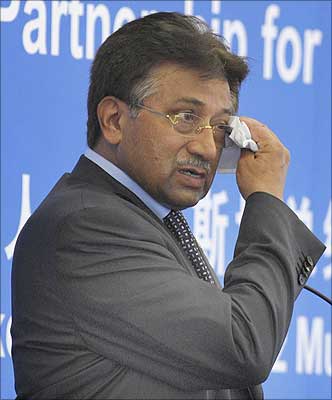
The first national-level conference of HuT was organised in Lahore in November 2003, two-and-a-half years after it was formally launched in Pakistan. The conference was attended by over 2,000 members.
But hardly three days later, the Musharraf regime had banned the group. The government action was challenged in the Lahore high court, but the plea was dismissed. In 2006, the HuT filed another petition before the Rawalpindi bench of the Lahore high court, challenging the ban. The case is still pending.
However, since its inception in Pakistan in 2000, the Hizbul has been able to make considerable progress in recruiting dedicated members in the civil society as well as the armed forces of Pakistan.
According to those investigating Brigadier Khan and several other senior officers of the Pakistan Army for their HuT links, despite claiming to be a non-violent political party, the HuT had a violent jehadi agenda to overthrow the government and remove the military top brass.
The investigators say the HuT leadership had actually marked Pakistan as a base from which it wanted to spread Islamic rule across the world. The group is working in tandem with Al Qaeda under the garb of pan-Islamism.
They reminded that 35 HuT members were arrested in June 2009 from an Islamabad residence which was allegedly being used to plan a coup. A few weeks before these arrests were made public, the Pakistan chapter of the HuT had talked about spilling blood to stage an Islamic revolution in the country.
At the same time, Tayyab Muqeem, a London-based key HuT leader, had declared in July 2009 that many of the HuT activists had been sent to Pakistan to bring about Islamic Shariah by force. He further claimed that the HuT had successfully converted four senior officers of Pakistan Army during their training at the Royal Military Academy Sandhurst, commonly known as Sandhurst, an elite training academy in England.
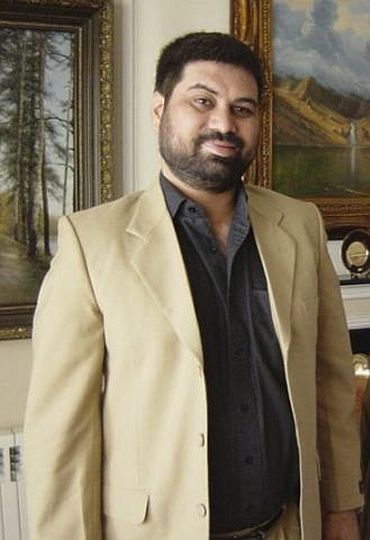
A senior Pakistani journalist, Syed Saleem Shehzad, who was abducted and killed under mysterious circumstances recently, had disclosed in his book titled Inside Al-Qaeda and Taliban, how the HuT-linked security officers of General Pervez Musharraf had helped in clearance of Al Qaeda's security consignment.
Saleem Shehzad narrated in his book the details of Al Qaeda's penetration into the Pakistan Army. He disclosed how a serving captain, Farooq, who was Musharraf's security officer, had helped a defected Major Haroon Ashiq, an Al Qaeda affiliate, in the clearance of night vision goggles flown from China.
On page 88 of the book, Saleem states: "Major Haroon Ashiq visited China to procure night-vision goggles [to be used by the militants]. The biggest task was to clear them through the Customs in Pakistan. Haroon called on his friend Captain Farooq, who was Musharraf's security officer."
"Farooq personally went to the airport in the President's official car and received Major Haroon at the immigration counter. In the presence of Farooq, nobody dared touch Haroon's luggage and the night-vision glasses arrived in Pakistan without any hassle," it reads.
Captain Farooq was a member of the HuT, a fact discovered by the Military Intelligence nine months after his posting as Musharraf's security officer. On being spotted, he was briefly arrested and then retired from the Pakistan Army.
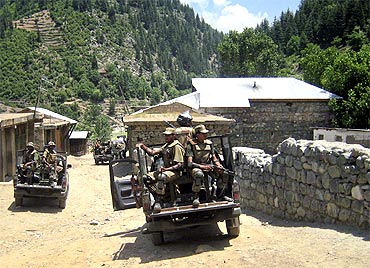
According to Maajid Nawaz, a former HuT member, now serving as director of the United Kingdom-based think tank Quilliam, the menace of HuT infiltrating the Pakistani armed forces was exported from Britain.
"HuT advocates violent overthrow of democratic states through military coups in order to enforce a single interpretation of Islam. Recruiting from the world's Muslim-majority armies is a fundamental tenet of their call. Groups such as HuT do not seek to launch a mass movement; rather they specifically target the intellectual elite and the military apparatus of the countries in which they operate," says Nawaz.
"For years, leading journalists and the intellectual elite of Pakistan have been targeted by highly educated English-speaking Islamists from HuT. They have been seeking to convert prominent opinion shapers to their supremacist ideology. Once this sector is taken, a military coup can be staged by key officers sympathetic to the cause, who would in turn face minimal resistance from society," he adds.
"After the coup, the military would be capable of establishing the authority of Islam. Hence a coup d' tat would be the manifestation of a political change, as per the HuT dream", adds Nawaz.
Khan's arrest over his jehadi links only confirms that the tug of war between Islamists and reformists in the army has reached a boiling point as the Islamic extremists and their ideological partners in the garrison are acting in unison to advance their anti-US and anti-state agendas.
This raises the billion dollar question: Is the jehadi penetration of the Pakistani armed forces deeper than feared?